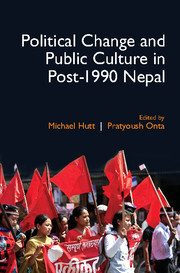Introduction - Political Change and Public Culture in Post-1990 Nepal
Published online by Cambridge University Press: 23 July 2017
Summary
Basheer Musalman
Poured us some sugar-water
And updated us on the village news.
The village is surrounded by the Rohini Khola
And is frightened by the deluge of rain.
In the eyes of the black girls
Who pick up gravel from the riverbanks and load it onto carts
Can be seen an unusual light.
You will find no difference between their skin,
Branded by the midday sun,
And Basheer's politics,
But he once saved some leader
(Who is now the Prime Minister)
By putting his neck on the line.
Basheer starts his account with this fact.
Basheer Musalman mixed the story of Surajpura
In with the sips of sugar-water.
What do they think,
Those black girls who pick up the gravel,
About the river breaching its banks,
The rising flood,
And their rising youth?
What do they think,
Those black girls,
About shifting their loads onto oxen
And feeling or not feeling light?
About Basheer's hero of history
And the streams that come mixing into the Rohini?
What do they think
About whether the white hills to the north have melted?
Who knows what they think
About the seed of fire that must be ignited in their homes?
About the jungle tigers with whom they must soon sleep?
I ask Basheer—
What do they think, these girls,
About the other girls like themselves?
‘They don't think anything’
Said Basheer Musalman,
‘No, they can't think at all’,
And he closed his eyes.
Shyamal, ‘Snow on Bhairahawa’ (Bhairahawama Hium, 1994), tr. Michael HuttThis book is the product of a research collaboration between the Department of the Languages and Cultures of South Asia at the School of Oriental and African Studies (SOAS), University of London, and the research institute Martin Chautari in Kathmandu, which was supported by a British Academy South Asia International Partnership. Over the course of its three-year duration (2010-13), this project, particularly the workshops it held in Kathmandu in 2011 and London in 2012, also drew in a number of other researchers from outside the two collaborating institutions.
Information
- Type
- Chapter
- Information
- Publisher: Cambridge University PressPrint publication year: 2016
